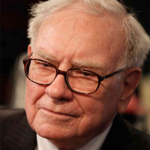 An interesting development happened Friday–Warren Buffett’s insurance and investment giant Berkshire Hathaway (BRK.A, BRK.B) saw its credit rating fall a notch yesterday, which did little to the stock, but is a significant development for anyone looking to invest in large-cap dividend-yielding stocks, if not in Berkshire directly.
An interesting development happened Friday–Warren Buffett’s insurance and investment giant Berkshire Hathaway (BRK.A, BRK.B) saw its credit rating fall a notch yesterday, which did little to the stock, but is a significant development for anyone looking to invest in large-cap dividend-yielding stocks, if not in Berkshire directly.
Among S&P’s reasons for downgrading the stock was concern that the company was too dependent on insurance operations for income, particularly the whims of regulators in the company’s (and Buffett’s) home state of Nebraska. The regulatory risk has been a primary concern in the insurance world since Obama’s Affordable Healthcare Act (Obamacare) passed, with the concern that this could depress insurance revenues in favor of lower medical costs to the bulk of Americans.
Concerns with Insurance Dividends
The target of insurance dividends goes much deeper than the politically charged and headline-grabbing concerns with Obamacare, of course. The fact is that, in the U.S., insurance dividends are on the decline.
Take a look at this table:
Except for Safety Insurance, which bucks the trend of the rest, these are large-cap, blue-chip, dividend-yielding stocks that are considered reliable and dependable companies that dividend investors can turn to in thick and thin. This reliability has made it appealing to investors, which paradoxically has made them less desirable over time.
Here you see that, even with dividend growth, dividend yields are down. This is because the price of these companies is going up. Allstate (ALL) is up over 50% from a year ago. Travelers (TRV) is up 37% and Progressive (PGR) is up 22%, even with a steep dividend cut in 2013 (for the purposes of this comparison, we’ll ignore special dividends).
This means that, over time, the insurance companies are a less desirable source of income because their stock price is going up faster than their dividend income can grow, due to a desperate search for yield amongst investors, which has made large-cap dividend yields go down as prices go up in recent years.
While this sounds good–and it is, from one perspective–it is also a problem for value investors like Buffett who look to buy undervalued companies to get maximum dividend yields. These companies are overvalued because of the flight to safety caused by economic uncertainty that has dragged dividend yields down since the market’s lowest touch point in 2009. This has happened to large-cap stocks besides insurance companies.
As a result, opportunities to profit from reinvesting profits in dividend-yielding companies are diminishing, in turn hurting value investors’ ability to profit. Thus Buffett’s credit rating dips slightly.
